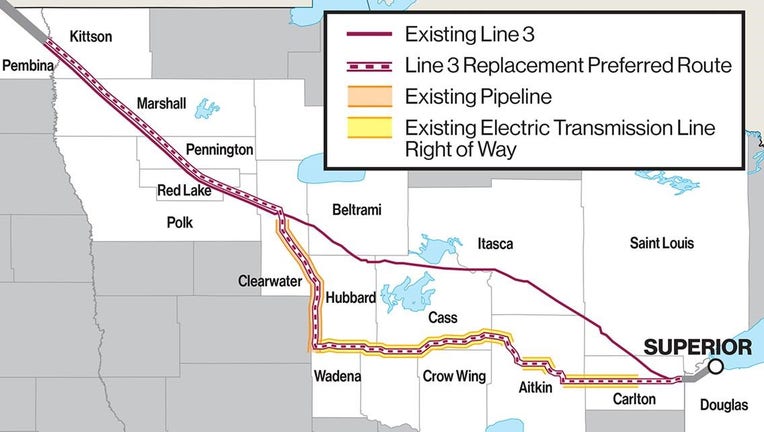Minnesota DNR approves all 10 required permits for Enbridge Line 3

ST. PAUL, Minn. (FOX 9) - The Minnesota DNR says it has approved all 10 permits requested by Enbridge for its Line 3 oil pipeline.
Last month, the DNR approved two of its 10 permits, with the decisions on the remaining eight coming Thursday.
Enbridge is proposing an oil pipeline in Minnesota to replace its existing Line 3, which is one of six Enbridge pipelines that cross the state in its mainline system.
After receiving its Gully 30 Fen Calcareous Fen Management Plan permit and its Gully 30 Fen Water Appropriation permit in October, the state issued the following additional permits and licenses Thursday:
- Work in Public Waters Permit for Willow River Bridge
- Work in Public Waters Permit for Public Water Wetlands on Private Land
- Water Appropriation Permit for Dust Suppression
- Water Appropriation Permit for Trench and Construction Dewatering
- Water Appropriation Permit for Hydrostatic Testing and Horizontal Directional Drilling
- Utility Crossing License for State Land
- Utility Crossing License for Public Water
- Threatened and Endangered Species Taking Permit
The DNR says the project has met the “applicable state of Minnesota environmental regulatory requirements to receive these approvals,” according to a release.
“As we did prior to making our Oct. 19 decisions, the DNR conducted a thorough review of these applications, and has determined that these final eight approvals, as conditioned, meet the requirements of state statutes and rules,” said DNR Deputy Commissioner Barb Naramore. “We carefully considered all comments and other input, as reflected in our decision documents.”
The approved permits will help the DNR regulate the way Enbridge navigates public waters, native species and public lands during construction and operation of the pipeline
Enbridge has also requested leases on state land for construction and maintenance of the pipeline. The DNR is still making decisions on those permits.
The DNR permits do not green light the entire project, however. The company must also receive regulatory approvals from other state, tribal and federal agencies before construction.

